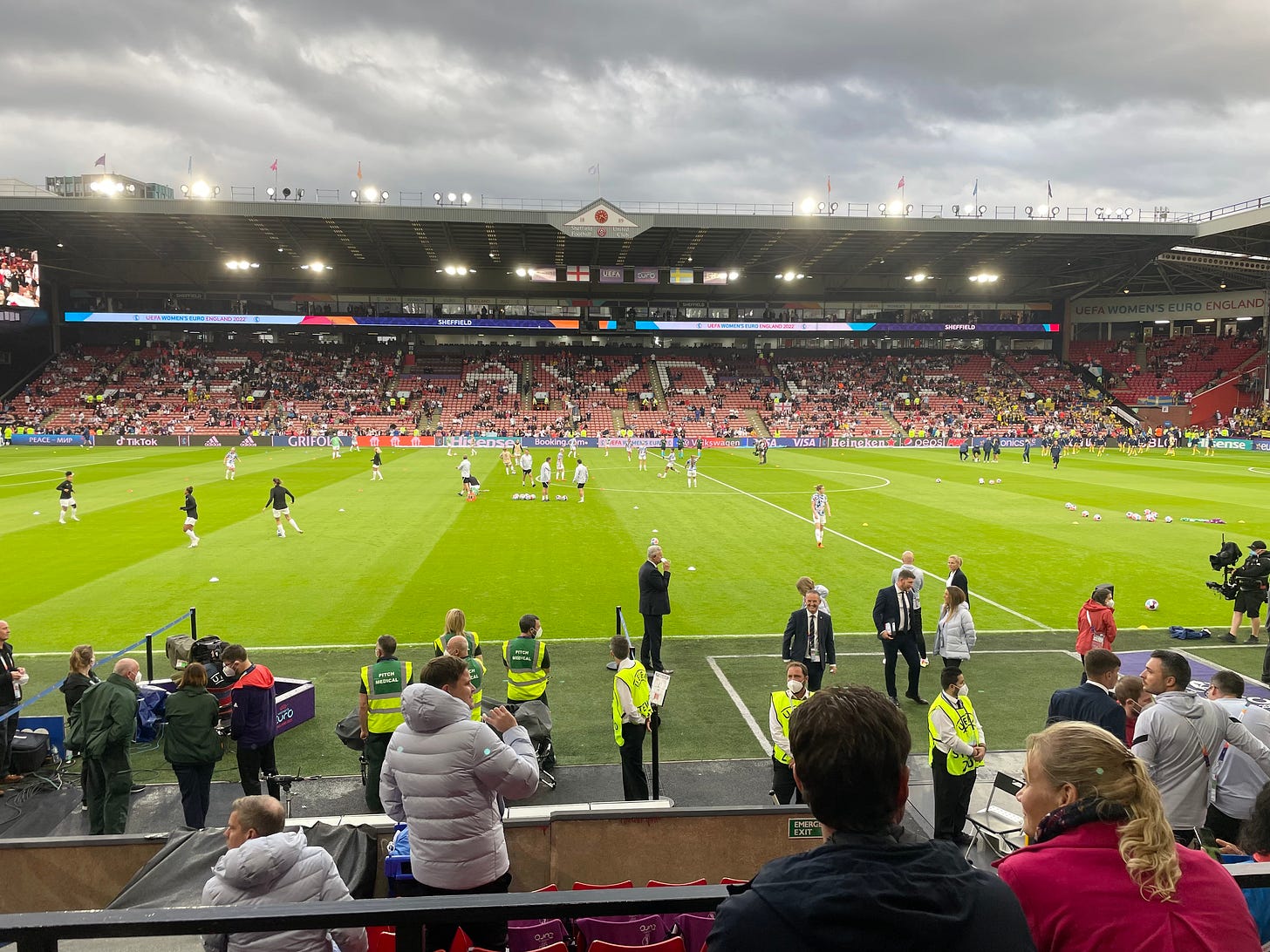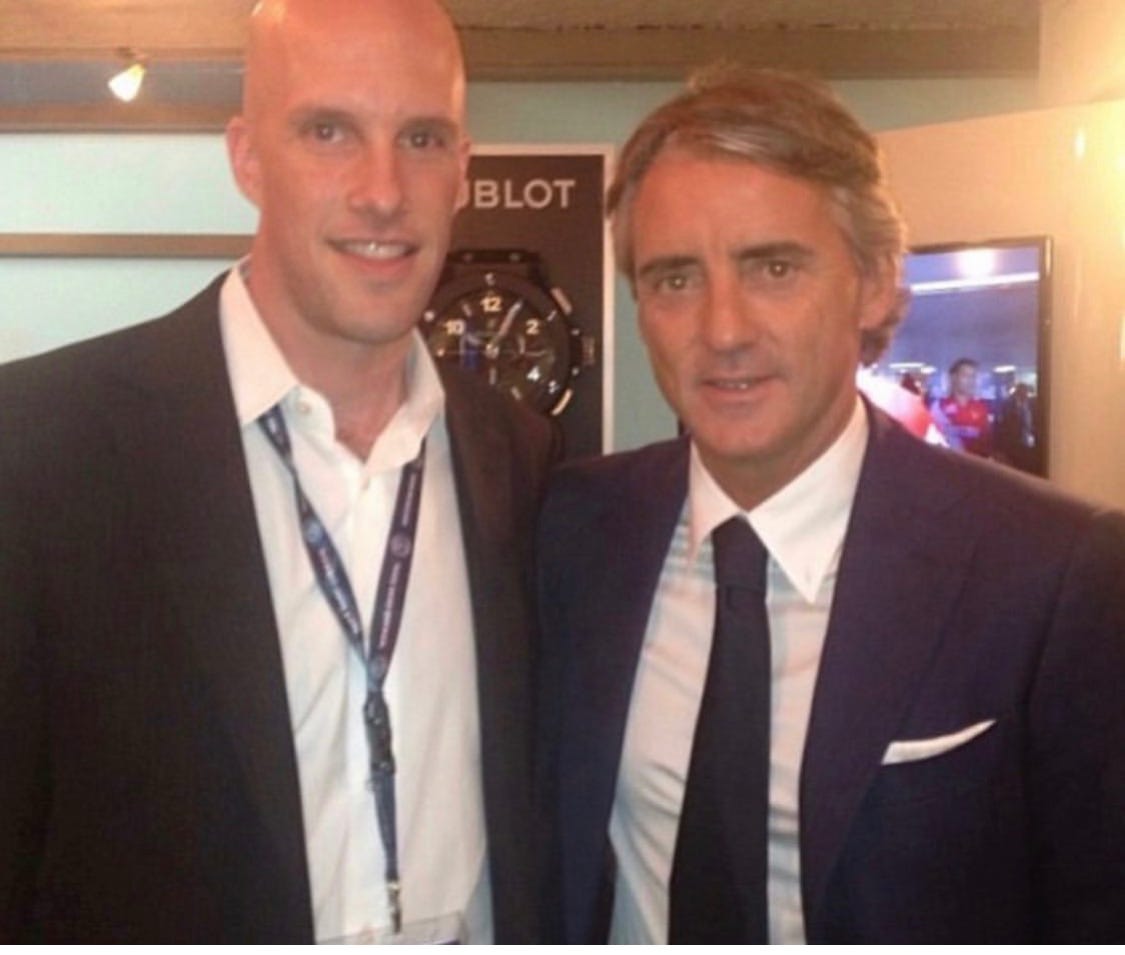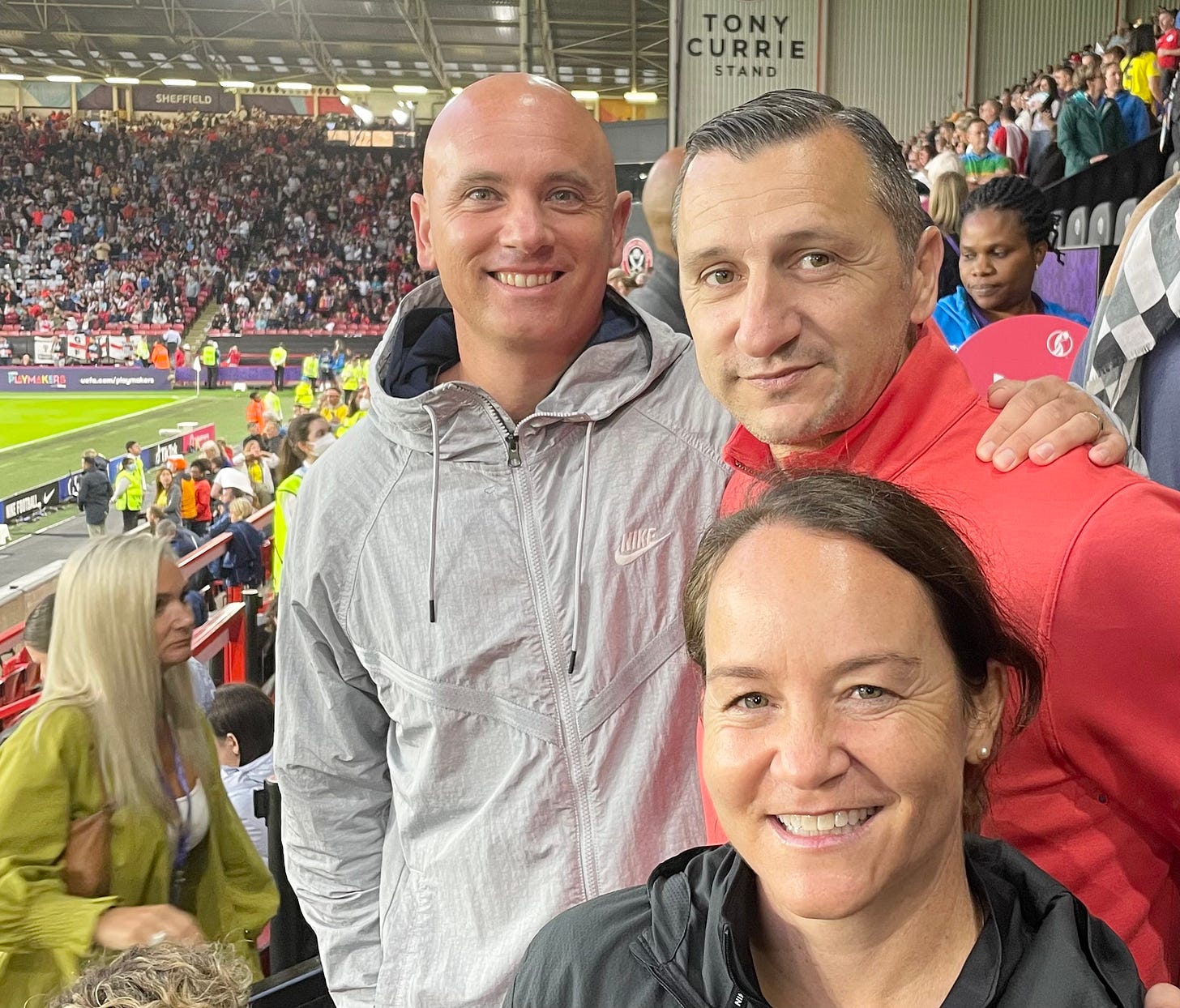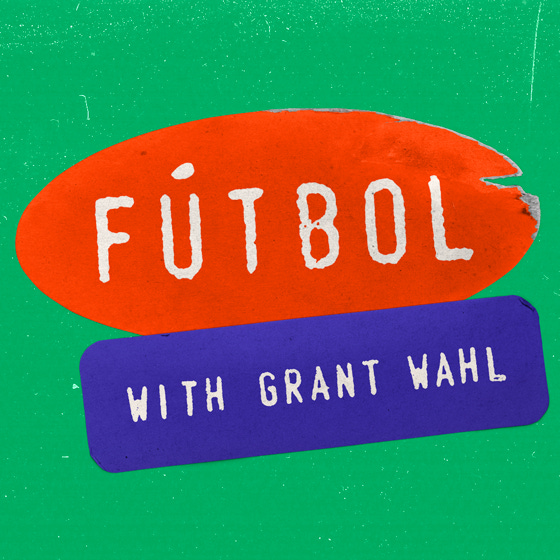Premium: 80% of Success is Showing Up
Whether you’re USWNT coach Vlatko Andonovski or a journalist like me, expending the effort to be at a marquee event like Euro 2022 makes a difference

SHEFFIELD, England — Show up. Always, always show up.
It’s one of the basic messages I share when aspiring journalists ask if I have any career advice. (Another one: Ask questions you don’t know the answer to.) And you’re never sure exactly when you might be in a position to choose: Follow your own advice or violate it?
On Monday, a day after arriving in London to cover the final week of Euro 2022, I got an email from UEFA responding to my request for a media seat at the England-Sweden semifinal here in Sheffield on Tuesday. Understand, you can have an accreditation to cover the tournament (as I do), but you still have to apply separately for a media seat in the stadium. This was the response from UEFA:
The last sentence was there for a reason. Translation: Don’t even think of coming, because we’re not changing our minds.
GrantWahl.com is a reader-supported soccer newsletter. Quality journalism requires resources. The best way to support me and my work is by taking out a paid subscription now. Free 7-day trials are available.
Look, I get it. There are only a small number of media seats at Sheffield United’s Bramall Lane, the 17th-largest soccer stadium in England, and a Euro semifinal involving England could easily have filled Wembley. Nor did it help that most of England’s big clubs begged off hosting Euro games in their stadiums. (Seriously, everyone, get with the program on women’s soccer.) As a result, even full-time women’s soccer reporters from outlets like The Telegraph couldn’t get media seats for England’s semifinal:

Would it have been better had organizers been more ambitious and put every Euro game in the biggest stadiums? Sure. That was the decision the U.S. architects of the 1999 women’s World Cup made (overruling FIFA’s hesitations) to their everlasting credit. The one positive of having the England semifinal in Sheffield (a two-and-a-half-hour train ride north from London) was that an area of the country that doesn’t get many huge games would finally have its chance.
But that didn’t help me get into the stadium on Tuesday. Truth be told, I thought about skipping the trip. It was the semifinal, not the final. What’s more, travel these days in Europe—even domestic train travel, which has been dealing with strikes this week—is a bit of a nightmare. And UEFA was saying: You really shouldn’t come. Plus I’m still not feeling great after finally getting Covid earlier this month, even though I’ve been testing negative for a week.
Then I heard that voice in my head: Show up. Always, always show up.
So I did. I ventured north from London on Tuesday, and my first stop was Bramall Lane, where I tried to at least get into the press workroom, even if I didn’t have a media seat inside the stadium. But no—a UEFA staffer on-site looked at a list and wouldn’t even let me do that. In a last-ditch effort, I emailed a friend at UEFA explaining my situation. He said he couldn’t guarantee anything but would see what he could do. And at 4:49 p.m., three hours before kickoff, I received an email:
Even better, I discovered upon entering the stadium that my freebie seat was in a VIP section at midfield right behind the England bench.
Over the years, I’ve had some amusing experiences in Europe being whipsawed between the cold shoulder and the VIP treatment. Sometimes club press offices just aren’t sure what to do with Americans. One time, in 2017, Manchester United simply refused to grant me a media seat for a Champions League game. Another time, in 2003, Man United arranged a one-on-one sit-down interview with Sir Alex Ferguson (who talked about his love for John Wayne movies) and gave me an amazing seat for the classic Champions League game the next day against Real Madrid. (OG Ronaldo had a hat trick and got a standing ovation from the Old Trafford fans upon leaving the game.)
Some gatekeepers just don’t like Americans. I’ll never forget the French media head for the 1998 World Cup standing above the seated Sports Illustrated writer Steve Rushin and flicking cigarette ashes on his head while saying, “You Americans are so arrogant.” Steve, who had simply been one minute late to pick up his media ticket for USA-Germany, was ready to fight the guy after initially being refused his ticket and receiving an ash shower.
But some gatekeepers love Americans, even in Paris. When I visited a Paris Saint-Germain game in 2013, the club didn’t put me in the media section but rather in the VIP area, where they introduced me to Roberto Mancini and I sat next to former French president Nicolas Sarkozy. (I never got around to asking Sarkozy why he doomed the U.S.’s bid to host World Cup 2022 by asking Michel Platini to vote for Qatar over the United States.)
You never know who you’re going to run into in a VIP area. And so it was great news that the first person I saw in mine on Tuesday night was Bibiana Steinhaus-Webb, the refereeing pioneer and the first woman to referee in the men’s German Bundesliga. Last year I wrote a story about her and her husband, the former English referee Howard Webb. Bibi, who seems to know everybody in the soccer world, gave me a big hug on Tuesday and asked to take a selfie.
And wouldn’t you know it? The seats next to me were taken by USWNT coach Vlatko Andonovski and his assistants Twila Kilgore and Philip Poole, fresh off winning the CONCACAF championship, who are at the Euros scouting potential opponents at next year’s World Cup. I was just hoping to be one of the 28,000-plus people to get inside the stadium—and I ended up sitting next to the USWNT coaching staff.
Ultimately, the game itself was plenty enough to make for a memorable evening. Sweden controlled much of the first 25 minutes, but England took over and pulled away for an emphatic 4-0 victory—punctuated by Alessia Russo’s ridiculous backheel goal through the wickets of Swedish goalkeeper Hedvig Lindahl.
I’m planning to tell more of England’s story around the final, which has an off-the-hook buzz in this country ahead of the Sunday’s game in Wembley. But we’re a site that likes to serve USWNT fans, so I thought it would be good to hear Andonovski’s impressions of what he’s seeing here, and he said he’d be happy to connect with me for an interview on Wednesday afternoon.
All of it was a helpful reminder, even when you feel it might be hopeless: Show up. Always, always show up.
For Vlatko Andonovski, scouting the Euros as the coach of the two-time-defending World Cup champion USWNT is a little like Renoir slipping in to check out the latest Monet exhibition. But the World Cup is just a year away, and for Andonovski and his staff it’s important that they show up, too, to see things in their toughest opponents that aren’t always easy to detect on a video screen. That’s why they came here for the Euro quarterfinals through the final immediately after the U.S. won the recent CONCACAF W Championship in Mexico—and why they sent three scouts to the Euros to have someone at every single game of the tournament.
“It’s very important to see it in person, because the feeling of the pace, the intensity of the game, is a little bit different,” Andonovski told me on Wednesday. “On top of that, you see behavior of certain players that sometimes is not easy to see on camera. That’s why it’s important for us to feel the rhythm of the game, and to see the little details as well.”
When we talked at halftime of Tuesday’s semifinal, Andonovski said he was pleased with the U.S.’s overall performance in its 1-0 win over Canada in the CONCACAF final, even though he would have loved to see his team finish more of its scoring chances. But the fact remains that it’s hard to compare the CONCACAF tournament (with two teams in the top 25 of the FIFA rankings) and the UEFA championship (with six teams in the global top eight).
“That’s one of the reasons why [the Euros] is just of a little better quality,” said Andonovski. “Unfortunately, in CONCACAF there are only two in the top 10, and you can add other teams, but still it’s not the same as the top six teams [in UEFA].”
All things considered, any of those six European teams—England, France, Germany, the Netherlands, Spain and Sweden—are capable of ending the U.S.’s World Cup reign next year. And so I asked Andonovski if he could share his quick-take opinions on each of them.
England: “One thing that was interesting was the precision they had, how few mistakes they made in possession regardless of which part of the field they were in. They were very precise in the buildup and did not lose the ball, and also their confidence on the ball as well. I thought the three midfielders—Keira Walsh, Georgia Stanway and Fran Kirby—were really composed on the ball and were able to break lines in different ways, whether it was with the pass, the run or the dribble.”

France: “One thing that stood out to me for France was the individual quality of each player on the field, and ability to win individual battles anywhere on the field.”
Germany: “Very meticulous, very intense in their press and super hard-working. One thing with them is they’ll always find a way to score a goal.”
The Netherlands: “They were hit with couple misfortunes: Covid first, and then injury with Lieke Martens. I think they had to change some things throughout the tournament and become more of a grinder team than they have been before. Partially, it could be because of the mentality of the coach [Mark Parsons], but it could be because they were forced to do that. They ground out a result against Sweden, which I thought was a good comeback result early on in the tournament, and had to grind out results in different games. That was positive, I think, for the Netherlands. They’re a good team, and when they don’t go through some of those unfortunate events, I think they are going to be even better.”
Spain: “[The injury to star Alexia Putellas] was unfortunate, obviously. Even though they’re not in the semifinals, I think Spain’s true colors showed in the quarterfinal against England [a 2-1 loss], where I thought they played a tremendous game, but it was just unfortunate they didn’t score another goal to put the game away. That’s where England came out big and took full advantage of a couple opportunities they had.”
Sweden: “They were very physical, and their box entries are really dominant. They get in the box different ways, whether through a longball pass or a set play. Anytime they get in the box, they’re very dangerous.”
With 12 months to go before Australia/New Zealand, Andnovski and his staff are more concerned for now with their big-picture impressions of the teams they’re seeing. Which is to say he didn’t have any details to contribute on weaknesses in any of the teams here. “We’re not that close to World Cup to look for specific strengths and weaknesses. It’s an overall evaluation of the teams,” he explained. “As we’re getting closer to the World Cup is when we start narrowing down more details and more specifics.”
During the tournament in Mexico, Andonovski did say that the U.S. team might not be ready for the World Cup right now, but it most definitely will be in a year. So I asked him here what he was hoping to see that’s different then.
“The biggest thing now for us is just to synchronize the lines, the players and the players’ movements a little bit better,” he told me. “We’re at the point where we can clarify or crystallize the starting 11, or maybe players that we play together a little bit more going forward. With simple words, it’s just getting on the same page.”
Despite all the work he’s doing, Andonovski is also a soccer fan. And so he can’t help but be captivated like the rest of us who are seeing the enthusiasm here for the Euros. It can’t help but get you—and him—fired up for the World Cup.
“We’re watching games like [England-Sweden] in front of a full stadium, and that’s what it’s all about,” he said. “It’s about the big event, it’s about good the crowd, it’s about a good environment. Yeah, we’re certainly looking forward to [the World Cup].”
In a summer of non-stop travel, Andonovski is off to Costa Rica soon for the CONCACAF Under-20 tournament, but not until after he attends Sunday’s England-Germany final in a sold-out Wembley. As we signed off on Wednesday, I told him I’d see him at the final. I’ve applied for a media seat, but even if I don’t get one, I’ve already got another alternative lined up. You wouldn’t think I’d miss it, would you?











Nice one, and congrats on the good karma
Fabulous, Grant. The story before the interview is why we subscribe. It’s about as “inside baseball” as you can get. From “go home” to “VIP”. Thanks.
And I was going to ask if Vlatko was at the Euros for the newsletter. Great interview. This, too, is why we subscribe. Looking forward to the final recap.